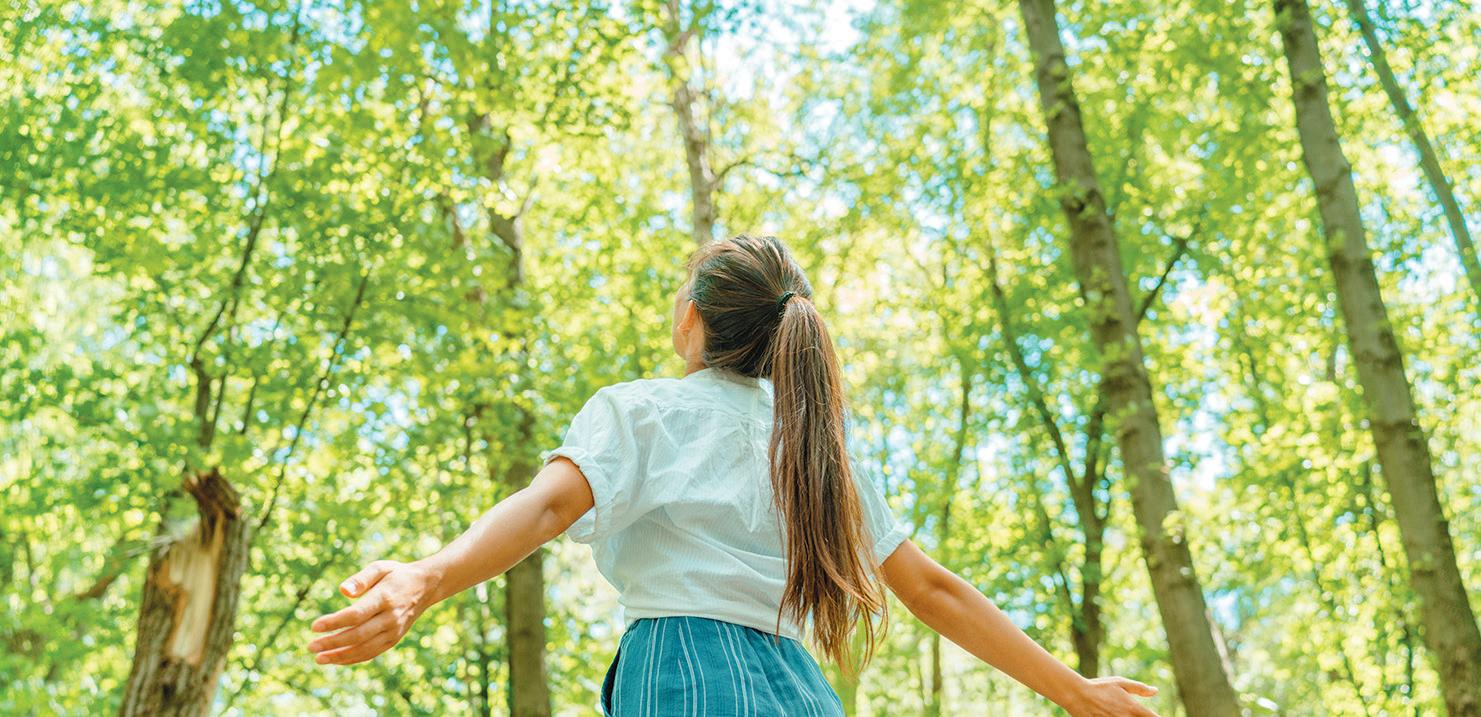
4 minute read
Earth-Friendly Hiking
global brief Squawk Talk
City Lights are Tough on Birds
Advertisement

Using satellite maps and radar to estimate the number of migratory birds streaming across the night sky, Chicago tops the list of cities where birds face the most danger from light pollution in both spring and fall. North America hosts about 3 billion fewer birds today than in 1970, according to a 2019 analysis published in Science. The causes include light pollution, climate change, vanishing habitat and pesticides. Scientists believe the combination of factors could lead many abundant bird populations toward extinction.
For example, Cornell University ornithologist Andrew Farnsworth found that the seven annual Tribute in Light twin towers anniversary memorials on September 11 that project intense beams of light into the night sky attracted an average of more that 1 million birds. Within the first 20 minutes of each event, up to 16,000 birds crowded into a tight radius. Bird conservationists listen for disoriented chirps and if too many are circling aimlessly in the beams, the lights are turned off.
BirdCast incorporates large-scale weather radar and machine learning to forecast the exact nights when hundreds of millions of migratory birds will arrive over U.S. cities. The team sends the data to conservationists and policymakers to help the birds by dimming lights along the way. Feel Better-Live Healthier with Colon Hydrotherapy
Serving Houston for 41 years
We use the Closed System & Disposable Setups.



Visit our website for more information or to schedule an appointment
Now Offering Mobile Colonics
Barbara J. Ellis, Retired RN, therapist & owner
Urban Colonics 5042 Briscoe St. Houston, TX.77033 713-738-8199 urbancolonics.com
Gemstones, Crystals, Geodes, Jewelry, Incense, Himalayan Salt Lamps, Handmade Items & More!
1900 Blalock Suite J Houston, TX 77080 (281)974-1043 indigomoons.net instagram @indigomoons.ig facebook.com/indigomoons
Feeling Stressed?
Call Today for a FREE Consultation
Kratom KreatDay.com 713-369-0946
Teas & Botanicals KreatDayBotanicals.com
Premium Lab Tested Kratom and CBD
GROW

YOUR BUSINESS
Secure this ad spot!
Contact us for special ad rates. 713-917-6540
Earth-Friendly Hiking
Hiking in the great outdoors is undoubtedly one of the most enjoyable sports on Earth, especially in the summertime, when the weather is temperate and the sun shines upon us. Unfortunately, nature’s charm can quickly fade when we stumble upon empty beverage cans, plastic sandwich bags or even worse, somebody’s still-smoldering cigarette butt, which could so easily become the next uncontrollable wildfire.
As stewards of the environment (and kind human beings), it’s important that we hike responsibly, leaving no detritus behind, respecting wildlife and preserving the pristine setting for everyone to enjoy. Here are a few tips for treading lightly on the next hiking trip. Avoid overcrowded places. The most popular national parks and hiking trails have been hosting a record-breaking number of visitors lately, severely stressing the flora and fauna. Consider exploring less trafficked spots so that these areas can recover. Stay close to home. Choose a trail close by to cut down on travel-related carbon emissions. For most of us, a beautiful natural setting is usually a short walk or bike ride away. Use sustainable gear. Wear outdoor gear by eco-friendly brands that strive to lower the carbon footprint in their sourcing, manufacturing and shipping practices, such as Patagonia or Merrell. Don’t litter. Leave no trash on the trail, including biodegradable items or food scraps, which could negatively impact wildlife. Remember to bring a bag on the walk to carry all refuse home—score extra points for picking up items that someone else might have left behind. Pack responsibly. Limit waste by wrapping homemade snacks and beverages in reusable bags and containers. Bring bamboo utensils. Bring a reusable water bottle. Single-use water bottles are out. Bring a lightweight, reusable bottle. For longer hikes near fresh water sources, invest in an on-the-go water filter. Ditch chemical products. Use chemical-free sunscreens and insect repellents to keep toxins out of the environment. This is especially important when taking an outdoor swim. Don’t take a souvenir. Resist the temptation to handle, move or take home items found on the trail. Rocks, shells, a handful of sand, pinecones, flowers—they’re all integral parts of the ecosystem, serving as food and habitat for wildlife. Stick to the trail to avoid trampling plants or causing other unintentional damage.
Don’t engage with the animals.
Getting uncomfortably close to touch, photograph or feed wild animals is a big no-no.



